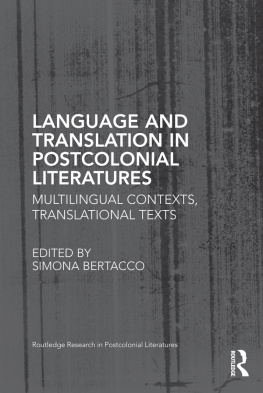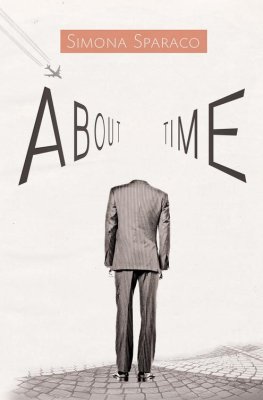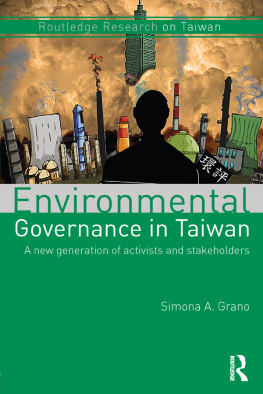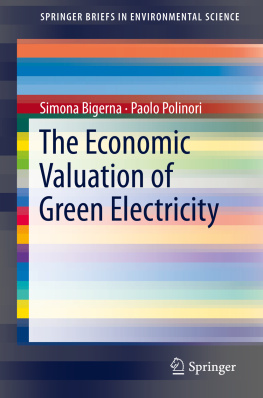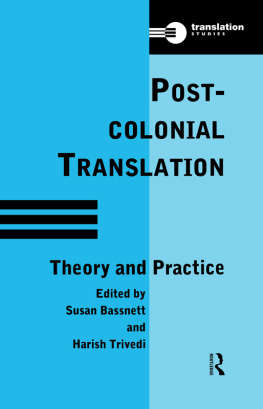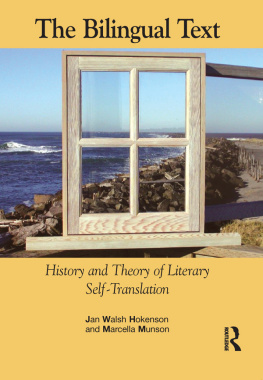Bertacco Simona - Language and Translation in Postcolonial Literatures
Here you can read online Bertacco Simona - Language and Translation in Postcolonial Literatures full text of the book (entire story) in english for free. Download pdf and epub, get meaning, cover and reviews about this ebook. year: 2013, publisher: Taylor and Francis, genre: Religion. Description of the work, (preface) as well as reviews are available. Best literature library LitArk.com created for fans of good reading and offers a wide selection of genres:
Romance novel
Science fiction
Adventure
Detective
Science
History
Home and family
Prose
Art
Politics
Computer
Non-fiction
Religion
Business
Children
Humor
Choose a favorite category and find really read worthwhile books. Enjoy immersion in the world of imagination, feel the emotions of the characters or learn something new for yourself, make an fascinating discovery.
- Book:Language and Translation in Postcolonial Literatures
- Author:
- Publisher:Taylor and Francis
- Genre:
- Year:2013
- Rating:5 / 5
- Favourites:Add to favourites
- Your mark:
- 100
- 1
- 2
- 3
- 4
- 5
Language and Translation in Postcolonial Literatures: summary, description and annotation
We offer to read an annotation, description, summary or preface (depends on what the author of the book "Language and Translation in Postcolonial Literatures" wrote himself). If you haven't found the necessary information about the book — write in the comments, we will try to find it.
Language and Translation in Postcolonial Literatures — read online for free the complete book (whole text) full work
Below is the text of the book, divided by pages. System saving the place of the last page read, allows you to conveniently read the book "Language and Translation in Postcolonial Literatures" online for free, without having to search again every time where you left off. Put a bookmark, and you can go to the page where you finished reading at any time.
Font size:
Interval:
Bookmark:
Language and Translation in Postcolonial Literatures
This outstanding collection gathers together a stellar group of contributors offering innovative perspectives on the issues of language and translation in postcolonial literatures. In a world where bi- and multilingualism have become quite normal, this volume identifies a gap in the critical apparatus in postcolonial studies in order to read cultural texts emerging out of multilingual contexts. The role of translation and an awareness of the multilingual spaces in which many postcolonial texts are written are fundamental issues with which postcolonial studies needs to engage in a far more concerted fashion. The essays in this book by contributors from Australia, New Zealand, Zimbabwe, Cyprus, Malaysia, Quebec, Ireland, Scotland, France, the US, and Italy outline a pragmatics of language and translation of value to scholars with an interest in the changing forms of literature and culture in our times. The essay topics include: multilingual textual politics; the benefits of multilingual education in postcolonial countries; the language of gender and sexuality in postcolonial literatures; translational cities; postcolonial calligraphy; globalization and the new digital ecology. This volume looks at translation as a basic feature of contemporary global culture, and argues for a translational model to keep postcolonial studies alive in the age of globalization and the internet.
Simona Bertacco is an Assistant Professor of Humanities at the University of Louisville, USA, and was previously a ricercatrice at the University of Milan, Italy. Her research focuses on issues in postcolonialism, womens and gender studies and translation studies. Her publications include: Skepticism and the Idea of an Other: Reflections on Cavell and Postcolonialism, in Stanley Cavell and Literary Studies (2011); Death and Its Rites in Contemporary Art & Culture (Altre Modernit #4 2010) co-edited with N. Vallorani; Postcolonialism, in The Oxford Companion of Philosophy and Literature (2009).
ROUTLEDGE RESEARCH IN POSTCOLONIAL LITERATURES
Edited in collaboration with the Centre for Colonial and Postcolonial Studies, University of Kent at Canterbury, this series presents a wide range of research into postcolonial literatures by specialists in the field. Volumes will concentrate on writers and writing originating in previously (or presently) colonized areas, and will include material from non-anglophone as well as anglophone colonies and literatures. Series editors: Donna Landry and Caroline Rooney.
1. Magical Realism in West African Fiction: Seeing with a Third Eye by Brenda Cooper
2. The Postcolonial Jane Austen edited by You-Me Park and Rajeswari Sunder Rajan
3. Contemporary Caribbean Womens Poetry: Making Style by Denisede Caires Narain
4. African Literature, Animism and Politics by Caroline Rooney
5. CaribbeanEnglish Passages: Intertextuality in a Postcolonial Tradition by Tobias Dring
6. Islands in History and Representation edited by Rod Edmond and Vanessa Smith
7. Civility and Empire: Literature and Culture in British India, 18221922 by Anindyo Roy
8. Women Writing the West Indies, 18041939: A Hot Place, Belonging To Us by Evelyn OCallaghan
9. Postcolonial Pacific Writing: Representations of the body by Michelle Keown
10. Writing Woman, Writing Place: Contemporary Australian and South African Fiction by Sue Kossew
11. Literary Radicalism in India: Gender, Nation and the Transition to Independence by Priyamvada Gopal
12. Postcolonial Conrad: Paradoxes of Empire by Terry Collits
13. American Pacificism: Oceania in the U.S. Imagination by Paul Lyons
14. Decolonizing Culture in the Pacific: Reading History and Trauma in Contemporary Fiction by Susan Y. Najita
15. Writing Sri Lanka: Literature, Resistance and the Politics of Place by Minoli Salgado
16. Literature of the Indian Diaspora: Theorizing the Diasporic Imaginary by Vijay Mishra
17. Secularism in the Postcolonial Indian Novel: National and Cosmopolitan Narratives in English by Neelam Srivastava
18. English Writing and India, 16001920: Colonizing Aesthetics by Pramod K. Nayar
19. Decolonising Gender: Literature, Enlightenment and the Feminine Real by Caroline Rooney
20. Postcolonial Theory and Autobiography by David Huddart
21. Contemporary Arab Women Writers by Anastasia Valassopoulos
22. Postcolonialism, Psychoanalysis and Burton: Power Play of Empire by Ben Grant
23. Transnationalism in Southern African Literature: Modernists, Realists, and the Inequality of Print Culture by Stefan Helgesson
24. Land and Nationalism in Fictions from Southern Africa by James Graham
25. Paradise Discourse, Imperialism, and Globalization: Exploiting Eden by Sharae Deckard
26. The Idea of the Antipodes: Place, People, and Voices by Matthew Boyd Goldie
27. Feminism, Literature and Rape Narratives: Violence and Violation edited by Sorcha Gunne and Zo Brigley Thompson
28. Locating Transnational Ideals edited by Walter Goebel and Saskia Schabio
29. Transnational Negotiations in Caribbean Diasporic Literature: Remitting the Text by Kezia Page
30. Representing Mixed Race in Jamaica and England from the Abolition Era to the Present by Sara Salih
31. Postcolonial Nostalgias: Writing, Representation and Memory by Dennis Walder
32. Publishing the Postcolonial: Anglophone West African and Caribbean Writing in the UK 19481968 by Gail Low
33. Postcolonial Tourism: Literature, Culture, and Environment by Anthony Carrigan
34. The Postcolonial City and its Subjects: London, Nairobi, Bombay by Rashmi Varma
35. Terrorism and Insurgency in Indian-English Literature: Writing Violence and Empire by Alex Tickell
36. The Postcolonial Gramsci edited by Neelam Srivastava and Baidik Bhattacharya
37. Postcolonial Audiences: Readers, Viewers and Reception edited by Bethan Benwell, James Procter and Gemma Robinson
38. Culture, Diaspora, and Modernity in Muslim Writing edited by Rehana Ahmed, Peter Morey, and Amina Yaqin
39. Edward Saids Translocations: Essays in Secular Criticism edited by Tobias Dring and Mark Stein
40. Postcolonial Memoir in the Middle East: Rethinking the Liminal in Mashriqi Writing by Norbert Bugeja
41. Critical Perspectives on Indo-Caribbean Womens Literature edited by Joy Mahabir and Mariam Pirbhai
42. Palestinian Literature and Film in Postcolonial Feminist Perspective by Anna Ball
43. Locating Postcolonial Narrative Genres edited by Walter Goebel and Saskia Schabio
44. Resistance in Contemporary Middle Eastern Cultures: Literature, Cinema and Music edited by Karima Laachir and Saeed Talajooy
45. The Postsecular Imagination: Postcolonialism, Religion, and Literature by Manav Ratti
46. Popular Culture in the Middle East and North Africa: A Postcolonial Outlook edited by Walid El Hamamsy and Mounira Soliman
47. The Ethics of Representation in Literature, Art, and Journalism: Transnational Responses to the Siege of Beirut edited by Caroline Rooney and Rita Sakr
48. Fiction, Film, and Indian Popular Cinema: Salman Rushdies Novels and the Cinematic Imagination by Florian Stadtler
49. Language and Translation in Postcolonial Literatures: Multilingual Contexts, Translational Texts edited by Simona Bertacco
Related Titles:
Postcolonial Life-Writing: Culture, Politics, and Self-Representation
Next pageFont size:
Interval:
Bookmark:
Similar books «Language and Translation in Postcolonial Literatures»
Look at similar books to Language and Translation in Postcolonial Literatures. We have selected literature similar in name and meaning in the hope of providing readers with more options to find new, interesting, not yet read works.
Discussion, reviews of the book Language and Translation in Postcolonial Literatures and just readers' own opinions. Leave your comments, write what you think about the work, its meaning or the main characters. Specify what exactly you liked and what you didn't like, and why you think so.

